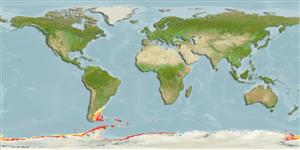Hydrozoa |
Leptothecata |
Sertulariidae
Environment: milieu / climate zone / depth range / distribution range
Ecology
Demersal; depth range 15 - 640 m (Ref. 7414). Polar
Antarctic-Patagonian.
Length at first maturity / Size / Weight / Age
Maturity: Lm ? range ? - ? cm Max length : 9.0 cm COLD male/unsexed; (Ref. 7414)
Monosiphonic colonies composed of a mass of branches and stems, irregularly branched in several planes and with anastomoses, up to 90mm in diameter, with the appearance of closely knitted net. Hydrothecae arranged in decussate pairs forming four longitudinal rows of hydrothecae. Hydrothecae immersed into the branches for approximately one-quarter of their volume and strongly curving outwards. Adcauline hydrothecal wall with a considerable free portion, adnate to internode for ca half or slightly more of its length. Free part of adcauline wall straight or slightly convex; abcauline wall concave. Hydrothecal aperture circular and tilted downwards; rim even and usually with numerous renovations. Female and male gonothecae present, both inserting individually at hydrothecal base. Female gonotheca urn-shaped; basal part ovoid, widening distally, apex contracted into a short neck bearing the aperture. Male gonotheca fusiform, with a distal, cone-shaped neck provided with a small, circular aperture.
Gonothecae with a few striae at base of neck.
Species had been found at depths 15 to 640 m on stony bottoms (Ref. 7414).
Life cycle and mating behavior
Maturity | Reproduction | Spawning | Eggs | Fecundity | Larvae
Fertile colonies are found in February.
Peña Cantero, A.L. and W. Vervoort 2003 Species of Staurotheca Allman, 1888 (Cnidaria; Hydrozoa: Sertulariidae) from US Antarctic expeditions, with the description of three new species. Journal of Natural History 37:2653-2722. (Ref. 7414)
IUCN Red List Status
(Ref. 130435: Version 2025-1)
CITES status (Ref. 108899)
Not Evaluated
Not Evaluated
Threat to humans
Harmless
Human uses
| FishSource |
Tools
More information
Trophic EcologyFood items (preys)
Diet composition
Food consumption
Predators
Population dynamicsGrowth
Max. ages / sizes
Length-weight rel.
Length-length rel.
Length-frequencies
Mass conversion
Abundance
Life cycleReproductionMaturityFecunditySpawningEggsEgg developmentLarvae PhysiologyOxygen consumption
Human RelatedStamps, coins, misc.
Internet sources
Estimates based on models
Preferred temperature
(Ref.
115969): 0.3 - 7.6, mean 5.4 (based on 227 cells).
Fishing Vulnerability
Low vulnerability (10 of 100).
